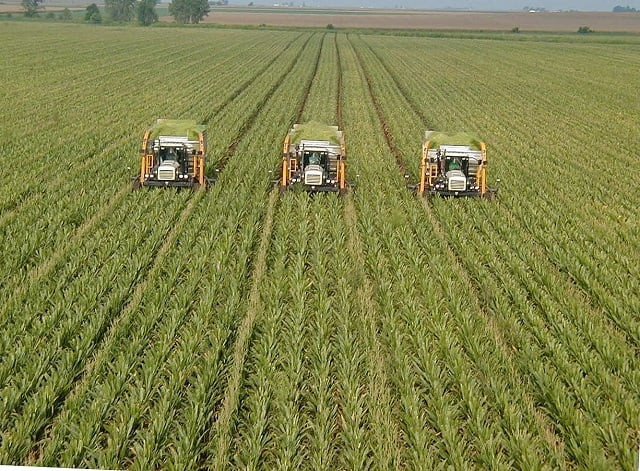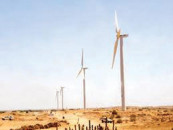Climate change killing agriculture
Changing weather has hit wheat and mango production this year

Climate shocks have started to shake the agricultural system of Pakistan. This year, the wheat crop has felt the severe impact of abrupt fluctuations in temperature. Wheat grain requires 10-12 days for maturity but a sudden change in temperature reduces the period to four days, which leads to the reduction in size and weight of the grain. It is anticipated that the staple crop will face 4-6% production loss this year.
Pakistan is already struggling to meet domestic demand for wheat and this loss will further aggravate the situation. Furthermore, the impact of climate change is also evident in the case of mango production. Owing to harsh weather, Pakistan will miss the production target this year. Apart from these, the water scarcity has had the worst impact as many parts of Pakistan are suffering from chronic shortages. Cholistan is one of the most affected areas, which is going through acute shortages of water. People are suffering and losing their sources of livelihood, eg livestock.
The phenomenon is not new. Pakistan has been suffering from the impact of climate change for a long time. The floods of 2010 to 2014 have played havoc. The floods of 2010 were the worst disaster in Pakistan’s history as the country faced a loss of $10 billion while its food insecurity increased by 10%. Although the climate change has caused widespread damage, the agriculture is one of the most affected sectors. Pakistan falls in the geographical area where the productivity of crops will drop sharply.
A study points out that in Pakistan climate change will decrease agricultural productivity by 8-10% till 2040 and wheat will be one of the major losers. Another study predicts that the worst impact of climate change will be felt by wheat and rice (especially Basmati rice) crops in the coming years. It anticipates that wheat yield will decrease by 6% and the Basmati rice yield will fall by 15-18% across Pakistan, except for the northern areas.
The Global Change Impact Study Centre also projects that due to climate change crop seasons are shrinking and shifting. It will have a severe impact on the crop productivity in future. Sea intrusion is another problem, which is engulfing the productive land. Pakistan has faced the worst impact in Badin, where hundreds of acres of productive land have been lost to the sea intrusion. It has also been predicted that climate change will bring new diseases, which will pose a new challenge to the agriculture sector.
In this backdrop, it is evident that the cost of negligence will be very high, as we know that Pakistan is an agricultural country where agriculture plays a multifaceted role in the economy. On the one hand, millions of people draw their livelihood from the agriculture sector while on the other, it provides cheap raw material for the leading industries like textile, leather, etc. Food security On top of everything, its contribution to food security is the most valuable and irreplaceable.
Pakistan is already facing the challenge of food insecurity as almost 58% of the population is food insecure. Now, imagine the scenario where the population will be increasing continuously and food production will be decreasing. Then what would be the situation of food security? It is alarming and scary. In this context, Pakistan needs to take urgent measures to avert the disaster. First of all, it needs to map the vulnerability across the agro-ecological zones. It is required because every zone has its own dynamics.
Second, the country needs to introduce the concept of climate-smart agriculture. Unfortunately, this is not being given serious consideration. In 2020, the Ministry of Climate Change announced that an all-inclusive climatesmart agricultural programme would be launched in collaboration with the Food and Agriculture Organisation (FAO) and with support from the Green Climate Fund. However, it is still in planning stages due to the failure of previous Pakistan Tehreeke-Insaf (PTI) government to provide matching resources and support.
Third, the government will have to strengthen the research and development (R&D) system, as most of the climate-related problems are unpredictable and only a sound R&D system can help to minimise the impact. For that purpose, the government will have to empower universities and merge research institutes with the leading universities in the country. It will help to engage students from the very early stage and help invest time in hardcore research.
Pakistan can start the process by merging the agricultural research institutes in Faisalabad with the University of Agriculture Faisalabad. After the merger, the university must be given the task to lead on two fronts. First, produce quality seeds and species with the ability to absorb climate shocks and grow and flourish in new climatic conditions. Second, build mechanisms for creating awareness of climate-smart agriculture among farmers. For that purpose, a specialised vocational and on-farm training programme should be developed. Later, the same model should be applied to the agricultural research institutes and universities across the country.
Fourth, Pakistan should immediately develop a climate change dashboard for agriculture. All agricultural universities should join hands and collaborate with the meteorological departments at the national and international levels. There is an urgent need to provide timely information to the farmers and evidence-based policy input. For information sharing, the universities should develop linkages with the agricultural extension departments. Innovative methods can also be applied like the studentfarm linkage programme, etc.
Fifth, in short term Pakistan can benefit from China through the agricultural cooperation programme under the China-Pakistan Economic Corridor. Good news is that the Chinese government has shown willingness to assist Pakistan. Chinese companies have also shown interest in providing quality inputs. Concluding, Pakistan must take immediate steps, rather it should work on war footing. It is not an option; it is a necessity and is needed to secure the interests of future generations.
THE WRITER IS A POLITICAL ECONOMIST


















COMMENTS
Comments are moderated and generally will be posted if they are on-topic and not abusive.
For more information, please see our Comments FAQ